Have you ever found yourself reminiscing about the rich scent of your mother’s cookies or your grandma’s special pastries wafting through their kitchens?
Those magical moments are more than just sensory delights; they’re bridges that connect generations through the sharing of cultural knowledge and experiences. Baking, especially with elderly loved ones, is not merely about savoring delightful pastries but cherishing and reliving the stories, memories and history kneaded into each ball of dough.
However, being concerned over an elderly loved one’s diminishing capabilities should not cause you to curtail shared baking experiences prematurely. In fact, baking, and cooking in general, can directly meet two of the most important on-going needs for people living with dementia:
- Eating nutritious meals, and
- Participating in engaging activities
Here are tips for baking with an elderly loved one so you can continue making precious memories safely and enjoyably!
Table of Contents
- Benefits of Baking With Older Adults
- Preparing to Bake with an Elderly Loved One
- Kitchen Safety Measures
- Savoring Mutual Memories for Today & the Future
Also see:
- Aging In Place Renovations that Add Value to Your Home
- Teas from Around the World that Provide 5 Powerful Health Benefits
- Steal These 10 Great Ideas for an Epic Kitchen Reorganization
- More Recommended Health & Home Wellness Articles
- Related Topics: Health & Home Wellness | Food & Cooking | Kitchen | Aging in Place
Benefits of Baking With Older Adults
Just like a cake missing its sweet frosting, the golden years of our lives can feel incomplete without engaging activities and interests.
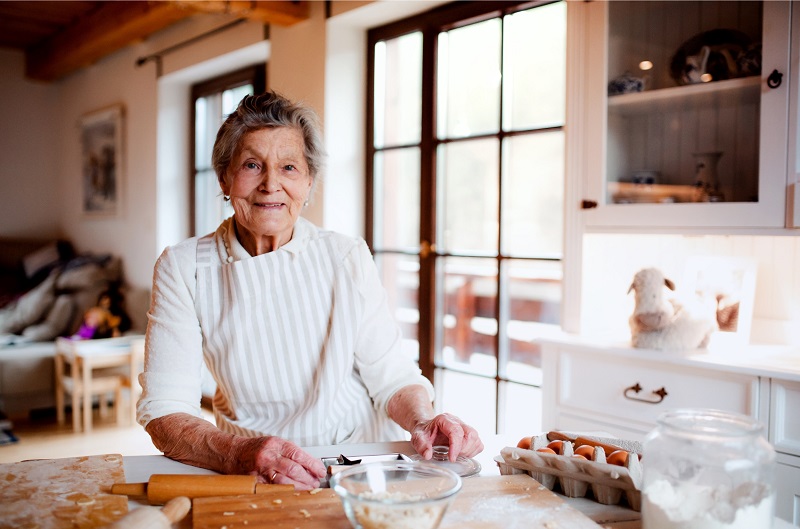
Baking isn’t just about whipping up delicious treats – it’s also about creating lasting memories, especially for those struggling with memory issues and dementia. Baking a favorite family recipe can serve as a multi-sensory trip down memory lane, reminiscent of the good ol’ days when the kitchen was alive with the aroma of fresh pies and cookies.
When you engage in baking with older members of your family, it’s much more than just a culinary endeavor. It can be about bonding, sharing stories, learning family history and building emotional connections.
Especially important for dementia patients, baking is a sensory experience. The touch of flour, the scent of vanilla, and the sound of the mixer can invoke deep-seeded powerful memories. Moreover, it offers a sense of accomplishment and can be one of those meaningful activities for dementia patients that helps them feel grounded and capable.
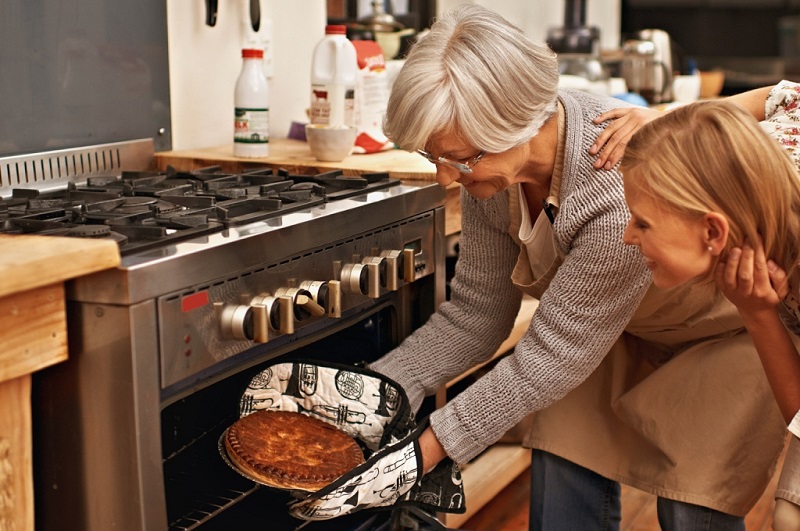
Bonding experiences through activities such as baking can combat feelings of isolation and loneliness in older adults. Baking can provide a sense of purpose and achievement, boosting their overall emotional well-being.
When not baking together in-person, keeping up with cooking shows on TV or streaming services, such as the universally favorite The Great British Baking Show (AKA The Great British Bake Off), is a great way to maintain and share common interests with loved ones.
Also see:
Preparing to Bake with an Elderly Loved One
Diving into the world of baking with an older loved one, especially someone with dementia, can be much like unwrapping a cherished family heirloom. Every step, every ingredient, and every moment has its own unique story to tell.
But, like a theater performance, the magic on stage is just the tip of the iceberg. Behind the scenes, preparation holds the key. For our culinary act, this means setting the stage just right, ensuring not only a delightful baking experience but also a comforting journey down memory lane:
- Choose a Recipe that’s Simple, Familiar and Healthy
- Gather and Double-check Ingredients and Equipment Beforehand
- Create a Safe and Accessible Environment
Also see:
Choose a Recipe that’s Simple, Familiar and Healthy
A key to baking with seniors is to keep recipes simple and familiar. You know, like that old classic song that everyone hums along to, forgetting the worries of the world. Maybe a recipe that’s been passed down through the generations or one your older family member loved baking back in the day.
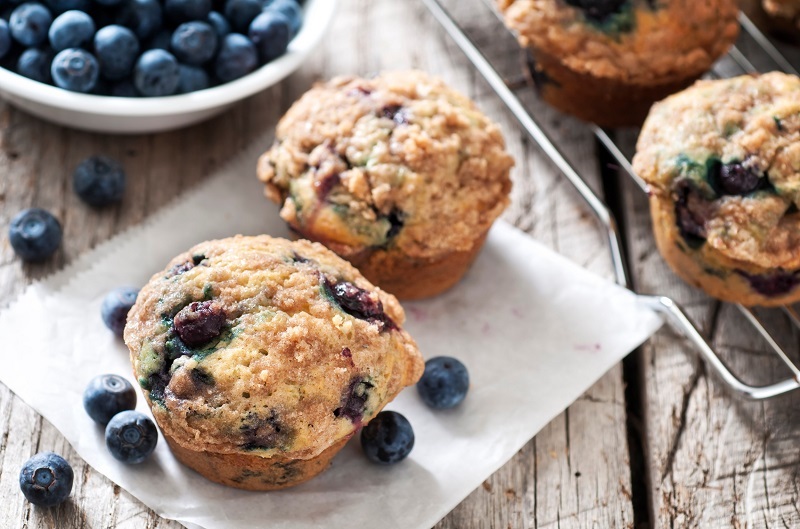
Opt for simple and familiar recipes, such as classic chocolate chip cookies, muffins, banana bread, or simple cakes. Avoid overly complex recipes that might frustrate seniors. Another approach is to learn simpler versions of classic recipes or healthier versions such as substituting eggs with yogurt.
Balance indulgence with health. Opt for recipes that incorporate nutritious ingredients, and be mindful of any dietary restrictions.
Edublox Online Tutor summarized scientific research that revealed foods that can help improve memory and cognitive abilities, including the following that can used in baking recipes:
- Blueberries
- Carrots
- Pumpkin Seeds
- Raisins
- Walnuts
Learning about “ordinary foods” with “extraordinary health benefits” is especially valuable for young children and teenagers, as they can turn these dietary choices into life-long habits.
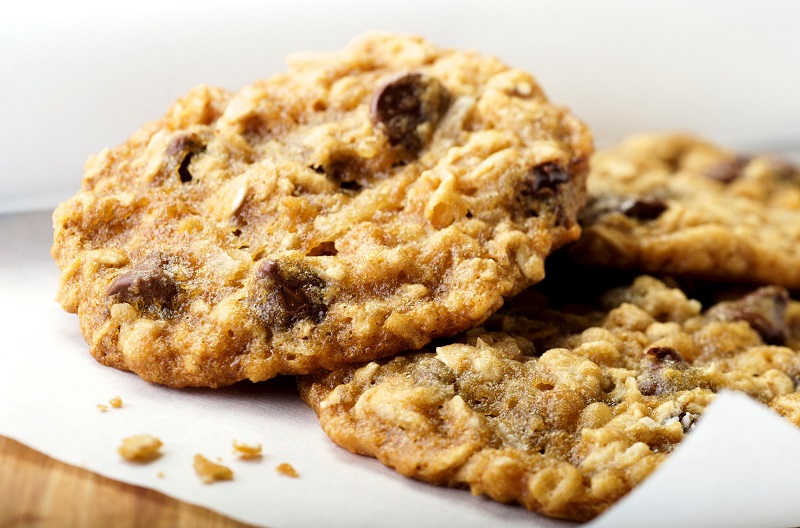
On the topic of health, also be sure to explore the wide-range of health benefits of teas, especially green teas. Enjoying a hot cup of tea with your freshly baked treats will deepen the sensory experience, while establishing new healthy habits.
Here are links to a few recipes that offer a combination of popular flavors, easy steps and good health benefits:
- Healthy Apple Cinnamon Muffins
- Banana Bread with Walnuts
- Easy Blueberry Muffins
- Healthy Oatmeal Cookies
- Healthy Pumpkin Pie
Also see:
Gather and Double-Check Ingredients and Equipment Beforehand
Be sure to gather all necessary ingredients and equipment upfront to prevent any potential oversights. If baking in the kitchen of your elderly family member be sure to check for any spoiled foods and ingredients.
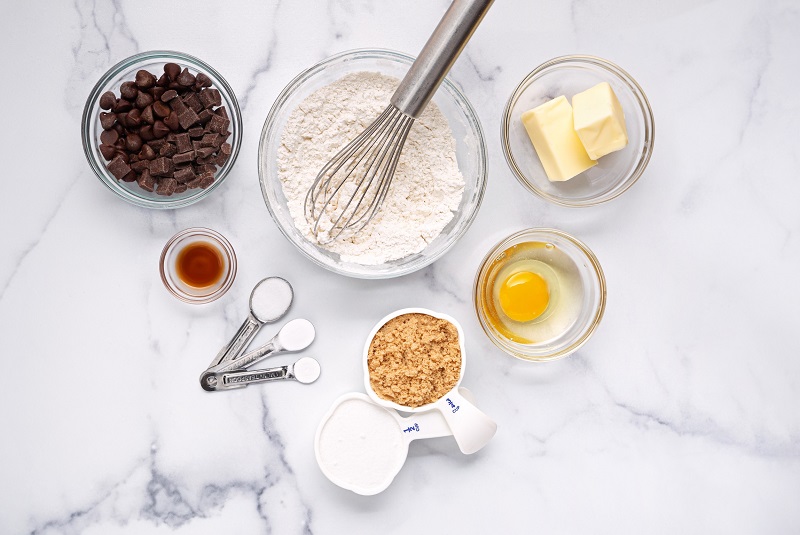
The last thing you’d want is for your baking journey to get side tracked by missing ingredients or inadequate tools. It’s akin to misplacing the TV remote and then forgetting what you were even searching for in the first place – unfortunately a common feeling for many dementia patients.
Use utensils and equipment that are safe and easy to handle. Assistive technology devices like jar openers or ergonomic mixing bowls can be invaluable, as well.
Lay out all your ingredients and equipment, and ensure you have everything at hand. This not only makes the process smoother, but also serves as one of the meaningful activities for seniors, helping them recollect and reconnect.
Also see:
Create a Safe and Accessible Environment
Imagine being in a place where everything seems a bit too high to reach or too complex to understand – pretty frustrating, right? The same goes for seniors, so try to setup the kitchen workspace with their key needs in mind.
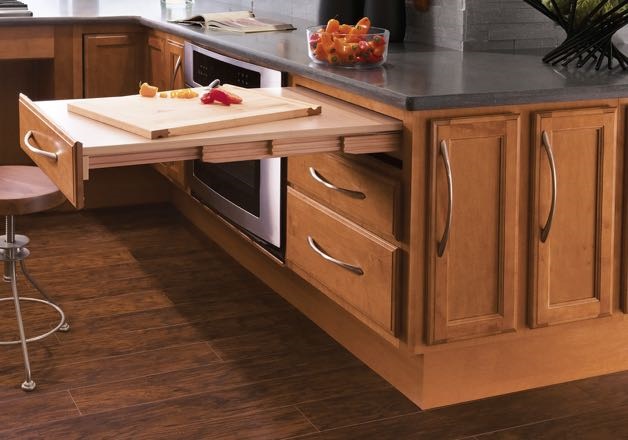
ADA-compliant cabinetry with pullout counter from KraftMaid
It’s essential to make sure everything is within arm’s reach and the process is as straightforward as possible. An organized space is like a beacon in the foggy memory lane, guiding your loved ones safely through the recipe.
Also see:
Kitchen Safety Measures
Navigating the kitchen, especially with dementia, can be like walking through a labyrinth. So, let’s make sure we don’t get lost or, even worse, hurt in the process.
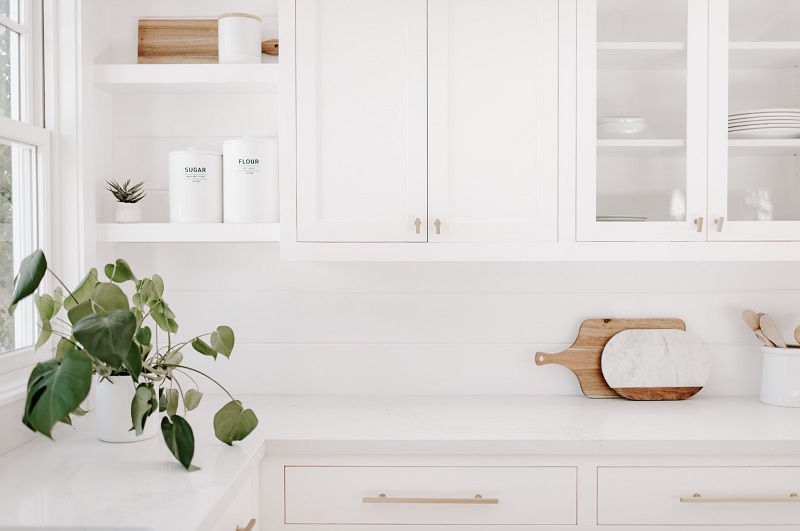
Below are some safety measures you should observe:
- Use Oven Mitts When Handling Hot Items
- Be Cautious with Sharp Utensils and Hot Surfaces
- Account for Current Food Allergies and Dietary Restrictions
- Keep Pathways Clear of Clutter
- Regularly Sanitize Hands and Surfaces
- Turnoff and Disconnect Appliances When Not in Use
Also see:
Use Oven Mitts When Handling Hot Items
Just as a forgetful moment can lead to misplaced keys, a distracted second can lead to a burnt finger. Always keep oven mitts nearby. It acts as a gentle reminder that:
“Hey, this is hot!“
Be Cautious with Sharp Utensils and Hot Surfaces
A knife in the kitchen can sometimes be like a fleeting memory for a dementia patient—sharp, but unpredictable. So, always handle with care, and ensure your loved ones are supervised when dealing with potentially dangerous items.
Account for Current Food Allergies and Dietary Restrictions
Dementia might cloud memories, but food allergies? They’re like the alarm bells that refuse to stay quiet. Always be sure to ask your loved ones about any food allergies, new dietary restrictions, or other sensitivities. You’d be surprised how certain memories, especially the ones associated with discomfort, stay clear as day.
Knowing current restrictions upfront will allow you to find adequate modifications in advance to make sure you can still bake some of your favorite recipes. For example you can use gluten-free flour or substitute sugar with honey or maple syrup.
Keep Pathways Clear of Clutter
A cluttered path is much like a jumbled memory – difficult to navigate. Ensuring that the kitchen floor is free from any obstacles is pivotal to prevent accidents. Not just for those with dementia, but for everyone involved. It’s always better to be safe than sorry, or as they say:
“Better to keep the cake on the table than on the floor!”
Regularly Sanitize Hands and Surfaces during the baking process
In the whirlwind of emotions and memories, it can be easy to be distracted and forget the basics. Regularly sanitizing during the baking process will ensure that while you’re diving deep into the past, you’re not bringing any unwanted guests, such as germs or pests, along for the ride.
Also see:
Turnoff and Disconnect Appliances When Not in Use
Closely supervise the use of any appliances and check that the appliances are turned off after each use. When feasible, disable appliances by unplugging them and moving them away from the dedicated workspace. Maintaining an uncluttered area will make the overall experience safer and more enjoyable.
Savoring Mutual Memories Today & the Future
In the heart of every kitchen lies stories waiting to be retold. Baking with our elderly loved ones, especially those with dementia, is a doorway to those tales.
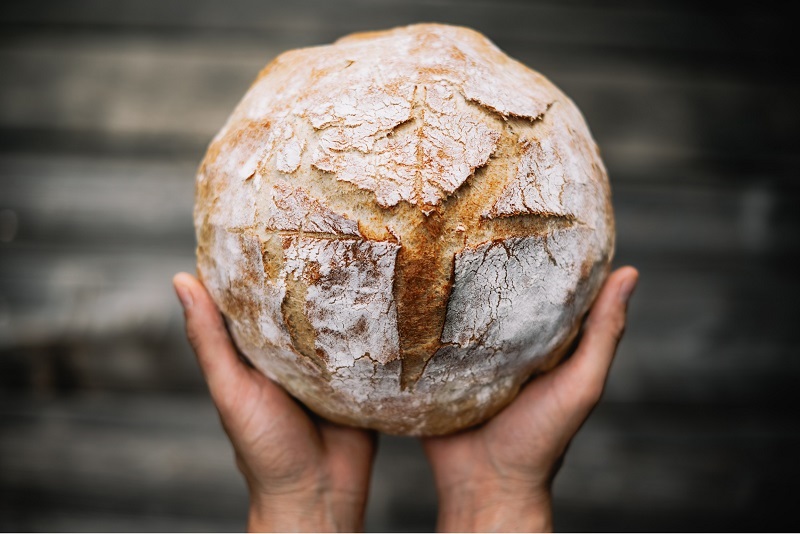
It’s not just about the delectable treats, but the cherished moments and memories created. So, take the time, set the stage, and relish in the joy of rekindling memories and strengthening bonds – one recipe at a time.
Additionally, the shared experiences in the kitchen can serve as a powerful inspiration to plan a family reunion. What better way to bring everyone together than by recreating beloved family recipes and passing down the traditions that have shaped your family’s story?
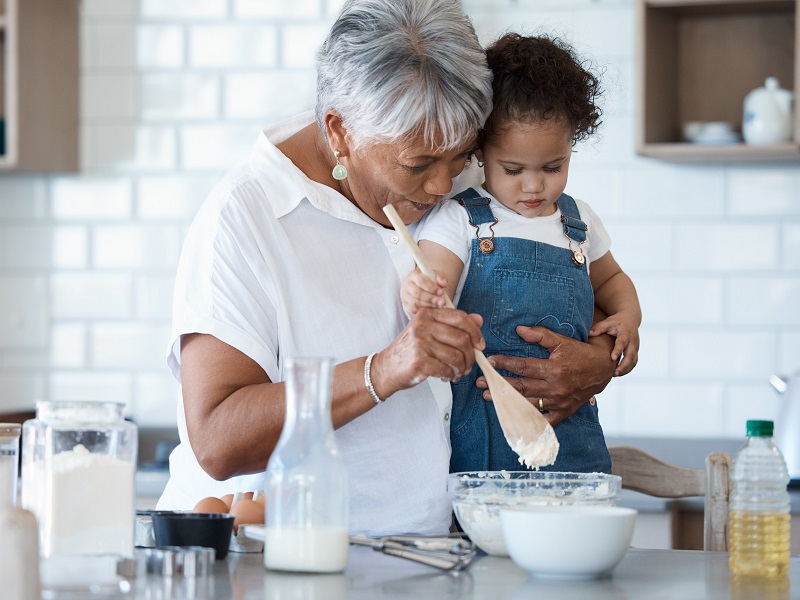
The act of baking, laden with nostalgia and interwoven with generations of love, could be the centerpiece of a heartwarming family gathering, where young and old unite to honor the past while building new memories for the future.
Also see:
Additional Health & Home Wellness Articles
- 13 Innovative Examples of Assistive Technology for the Home
- Need an Aging In Place Specialist? Look for These Certifications!
- Aging In Place Technologies for Today and the Future
- 4 Popular Reasons to Add an ADU to Your Property
- 8 Wellness Design Tips for Your Kitchen & Bath
- 6 Product Categories Defining Today’s Modern Kitchen
- 5 Often Overlooked Elements of Kitchen Remodels that Add Value
- Steal These 10 Great Ideas for an Epic Kitchen Reorganization
- Never Thought You’d Live in a Multigenerational Home? Think Again!
- Related Topics: Health & Home Wellness | Food & Cooking | Kitchen | Aging in Place
| Purgula is reader-supported. When you click on links to other sites from our website, we may earn affiliate commissions, at no cost to you. If you find our content to be helpful, this is an easy way for you to support our mission. Thanks! Learn more. |

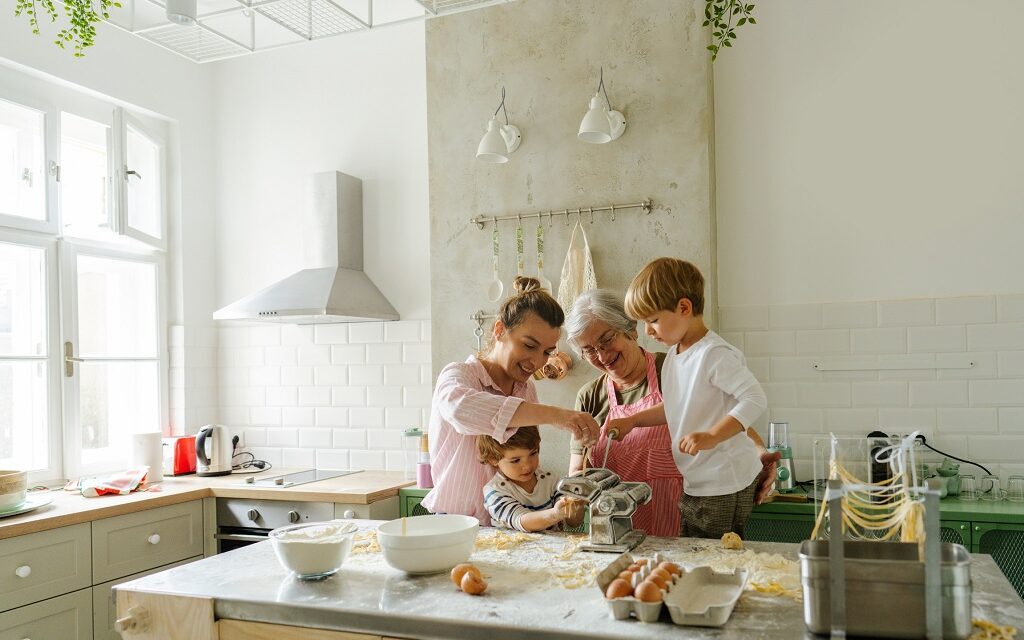






My Husband was diagnosed with Dementia when he was 62 years old 2 years ago. The Donepezil did very little to help him. The medical team did even less. His decline was rapid and devastating. It was Memory loss at first, then hallucination. Last year, a family friend told us about Natural Herbs Centre and their successful Dementia Ayurveda TREATMENT, we visited their website naturalherbscentre. com and ordered their Dementia Ayurveda protocol, i am happy to report the treatment effectively treated and reversed his Dementia disease, most of his symptoms stopped, he’s now able to comprehend what is seen, sleep well and exercise regularly.he’s active now, I can personally vouch for these remedy but you would probably need to decide what works best for you 💜.